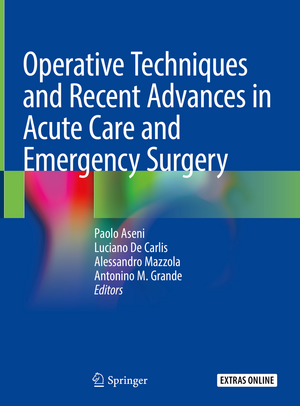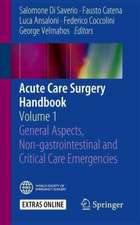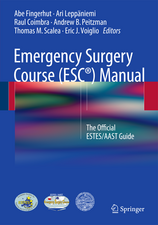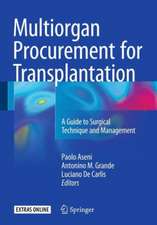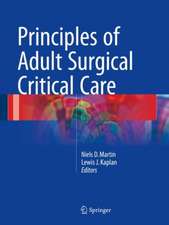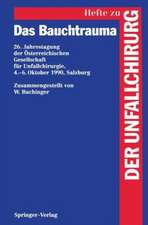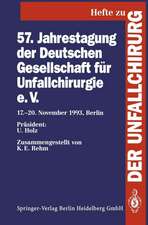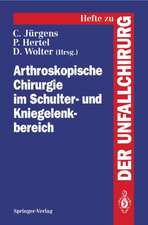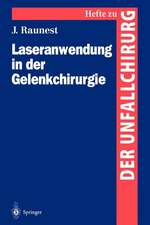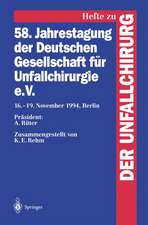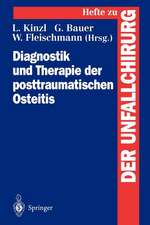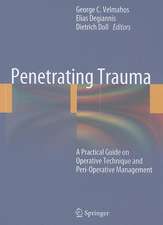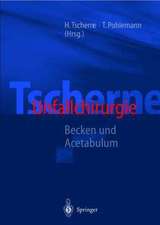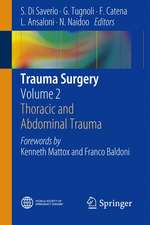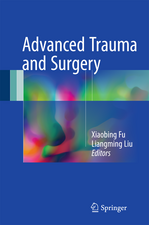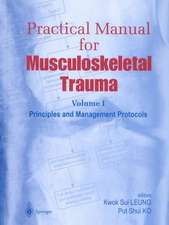Operative Techniques and Recent Advances in Acute Care and Emergency Surgery
Editat de Paolo Aseni, Luciano De Carlis, Alessandro Mazzola, Antonino M. Grandeen Limba Engleză Hardback – 21 feb 2019
Further, the book offers an overview of treatment options for acute organ failure, with a focus on peculiar clinical situations that call for special treatment, including: extracorporeal membrane oxygenation (ECMO), circulatory support and urgent liver transplantation. In order to identify the key determinants in decision-making and therapeutic support that can help avoid critical errors, authors not only define and discuss specific surgical techniques, but also present major issues and controversies related to it.
In essence, the book can be considered a “What to do guide” that offers easy access to both basic and advanced lifesaving surgical procedures, due in part to text boxes highlighting “Tips, Tricks and Pitfalls” as well as advice on “Complications Management”. Many chapters are enriched by providing clinical case scenarios, an important educational resource including self–assessment questionnaires.
Preț: 1534.84 lei
Preț vechi: 1615.61 lei
-5% Nou
Puncte Express: 2302
Preț estimativ în valută:
293.73€ • 305.52$ • 242.49£
293.73€ • 305.52$ • 242.49£
Carte disponibilă
Livrare economică 21-27 martie
Livrare express 08-14 martie pentru 139.28 lei
Preluare comenzi: 021 569.72.76
Specificații
ISBN-13: 9783319951133
ISBN-10: 3319951130
Pagini: 892
Ilustrații: XII, 800 p. 541 illus., 364 illus. in color. With online files/update.
Dimensiuni: 210 x 279 mm
Greutate: 2.44 kg
Ediția:1st ed. 2019
Editura: Springer International Publishing
Colecția Springer
Locul publicării:Cham, Switzerland
ISBN-10: 3319951130
Pagini: 892
Ilustrații: XII, 800 p. 541 illus., 364 illus. in color. With online files/update.
Dimensiuni: 210 x 279 mm
Greutate: 2.44 kg
Ediția:1st ed. 2019
Editura: Springer International Publishing
Colecția Springer
Locul publicării:Cham, Switzerland
Cuprins
Foreword.- Preface.- I General Principles.- 1 Surgical training for surgery and emergency surgery.- 2 Pathophysiology of acute illness and injury.- 3.- Shock states in acute care surgery.- 4 Pre-operative risk assessment.- 5 New advances in sepsis management.- II Trauma.- 6 Critical care resuscitation in trauma patients: basic principles and evolving frontiers.- 7 Airway management.- 8 Essential and basic operative techniques in trauma injuries.- 9 Modern management of maxillofacial injuries.- 10 Modern management of ophthalmic injuries.- 11 New advances in traumatic brain injuries.- 12 Operative techniques in blunt and penetrating neck injury.- 13 Operative techniques in spinal column and spinal cord injury.- 14 Operative technique in pelvic fractures.- 15 Chest wall and diaphragmatic injuries.- 16 Pleural, lung and tracheal injuries.- 17.- Vascular Injuries of the neck.- 18 Blunt trauma of the heart.- 19 Blunt trauma of the great vessels.- 20 Penetrating trauma of the heart and great vessels.- 21 Damage control and open abdomen in abdominal injury.- 22.- Operative techniques in abdominal injury.- 23.- Operative techniques in genitourinary trauma.- 24 Operative techniques in vascular injuries of the extremities.- III Non traumatic Emergency Surgery.- 25 Updates in diagnosis and management of acute gastrointestinal haemorrhage.- 26 Updates in the management of the inflammatory conditions and obstructions of the GI tract.- 27 Updates in the management of acute pancreatitis.- 28 Updates in the management of cholecystitis and cholangitis and obstructive jaundice.- 29 Updates in the management of Ob-Gyn emergencies.- 30 Updates in the management of non-traumatic thoracic and thoraco-abdominal vascular emergencies.- 31 Updates in the management of non-traumatic abdominal vascular emergencies.- 32 Updates in the management myocardial revascularization emergencies.- 33 Updates in the management heart valve emergencies.- 34 Updates in the management oesophageal emergencies.- 35 Updates in the management of GI tract foreign bodies.- 36 Updates in the management of anorectal abscess and inflammatory process.- 37 Updates in the management of abdominal wall hernias emergencies and reconstruction.- 38 Updates in the management of necrotizing soft tissue infections (NSTI).- IV Surgical critical care and special topics.- 39 Compartment syndrome.- 40 Invasive and non-invasive hemodynamic monitoring.- 41 Bedside US diagnosis and monitoring in ICU.- 42 Scoring Systems for Organ Injury.- 43 Multiple organ dysfunction syndrome.- 44 Updates in acute respiratory dysfunction: mechanical ventilator and ECMO support.- 45 Cardiovascular failure and mechanical circulatory support (LVAD).- 46 ECMO as a mechanical circulatory support.- 47 Acute liver failure and hyper-urgent liver transplantation.- 48 The potential organ donor.
Recenzii
“Senior trainees and providers are an appropriate audience. … This book is an effective combination of the evolution in European thinking with considered inclusion of the North American approach to trauma care. The scope is expansive and reference lists feature major contributions from both North America and Europe. … this book adequately presents the growing number of techniques and treatment strategies available to acute care surgeons.” (David J. Dries, Doody's Book Reviews, August 09, 2019)
Notă biografică
After graduating in Medicine at the University of Milan in 1975, Paolo Aseni trained in different centers in Germany and France: at the Medizinische Hochshule in Hannover and at the Zentrum für Experimentelle Medizin in München in 1978, then at the Hôpital Beaujon in Paris and at the Hôpital Paul Brousse in Villejuif. Since 1980, he has been working at the Department of Surgery and Transplant Center at the Niguarda Hospital in Milan, Italy, where he was mainly involved in abdominal organ transplantation and in emergency surgery. He is currently responsible for the basic surgical training of the emergency medical team in the Emergency Department at the same hospital. Since 1989, he has been also Assistant Professor for Anatomy and Human Macroscopic Morphology at the University of Medicine, Milan.
Luciano De Carlis obtained his degree in Milan in 1979 and trained as a visiting fellow at the Transplant Surgery Center in Pittsburgh (USA) in 1984, 1987, and again in 1988, studying particular aspects in the field of liver, kidney, pancreas, heart, and heart-lung transplantation. He was also a visiting professor at the University of Tokyo in 2001. Prof. De Carlis has been working at the Niguarda Hospital in Milan, Italy since 1985, specializing in the field of renal, hepatic, and pancreatic transplantation. He is currently Professor of Surgery at the University of Milano-Bicocca School of Medicine, and Director of the Department of Surgery and Transplant Center at the Niguarda Hospital in Milan, where he introduced the first adult living donor liver transplantation program in Italy and, recently, the first Italian liver transplant program from “donation after cardiac death”.
Alessandro Mazzola received his degree in Medicine at the University“La Sapienza” of Rome in 1979. Since 1980 he has been working as attending surgeon in the Department of Cardiac Surgery of the “G. Mazzini Hospital” in Teramo, where from August 2002 to July 2012 he was Director of the Department. Since August 2012 he has been Director of the Department of Cardiac Surgery in Fondazione IRCCS Policlinico San Matteo of Pavia. His main clinical interests include valvular surgery, myocardial revascularization and aortic surgery (thoracic and thoraco-abdominal). He has been invited to give lectures on these topics and he was also Assistant Professor in Cardiac Surgery at the University of l’Aquila.
Antonino M. Grande obtained his degree in Medicine at the University of Pavia (Italy) in 1980. He then trained at the Department of Cardiovascular Surgery, Texas Heart Institute, Houston, Texas, USA, from 1982 to 1984 and then in Marseille (France). Since 1986, he has been working as an attending surgeon at the IRCCS Fondazione Policlinico San Matteo in Pavia, Italy, in the Cardiac Surgery – Heart and Lung Transplant Department. Dr. Grande has over 25 years of experience in cardiovascular postoperative intensive care; his main clinical interests include heart failure, heart/lung transplantations and mechanical circulatory support. Between 2000 and 2010, he was Assistant Professor for Surgical Anatomy at the University of Pavia.
Luciano De Carlis obtained his degree in Milan in 1979 and trained as a visiting fellow at the Transplant Surgery Center in Pittsburgh (USA) in 1984, 1987, and again in 1988, studying particular aspects in the field of liver, kidney, pancreas, heart, and heart-lung transplantation. He was also a visiting professor at the University of Tokyo in 2001. Prof. De Carlis has been working at the Niguarda Hospital in Milan, Italy since 1985, specializing in the field of renal, hepatic, and pancreatic transplantation. He is currently Professor of Surgery at the University of Milano-Bicocca School of Medicine, and Director of the Department of Surgery and Transplant Center at the Niguarda Hospital in Milan, where he introduced the first adult living donor liver transplantation program in Italy and, recently, the first Italian liver transplant program from “donation after cardiac death”.
Alessandro Mazzola received his degree in Medicine at the University“La Sapienza” of Rome in 1979. Since 1980 he has been working as attending surgeon in the Department of Cardiac Surgery of the “G. Mazzini Hospital” in Teramo, where from August 2002 to July 2012 he was Director of the Department. Since August 2012 he has been Director of the Department of Cardiac Surgery in Fondazione IRCCS Policlinico San Matteo of Pavia. His main clinical interests include valvular surgery, myocardial revascularization and aortic surgery (thoracic and thoraco-abdominal). He has been invited to give lectures on these topics and he was also Assistant Professor in Cardiac Surgery at the University of l’Aquila.
Antonino M. Grande obtained his degree in Medicine at the University of Pavia (Italy) in 1980. He then trained at the Department of Cardiovascular Surgery, Texas Heart Institute, Houston, Texas, USA, from 1982 to 1984 and then in Marseille (France). Since 1986, he has been working as an attending surgeon at the IRCCS Fondazione Policlinico San Matteo in Pavia, Italy, in the Cardiac Surgery – Heart and Lung Transplant Department. Dr. Grande has over 25 years of experience in cardiovascular postoperative intensive care; his main clinical interests include heart failure, heart/lung transplantations and mechanical circulatory support. Between 2000 and 2010, he was Assistant Professor for Surgical Anatomy at the University of Pavia.
Textul de pe ultima copertă
The aim of this book is to identify and shed new light on the main surgical practices involved in acute care and trauma surgery. Adopting an evidence-based approach, a multidisciplinary team of surgeons and intensivists illustrate basic and advanced operative techniques, accompanied by a comprehensive and updated reference collection. Emerging surgical procedures in Acute Care Surgery are also explored step by step with the help of ample illustrations.
Further, the book offers an overview of treatment options for acute organ failure, with a focus on peculiar clinical situations that call for special treatment, including: extracorporeal membrane oxygenation (ECMO), circulatory support and urgent liver transplantation. In order to identify the key determinants in decision-making and therapeutic support that can help avoid critical errors, authors not only define and discuss specific surgical techniques, but also present major issues and controversies related to it. In essence, the book can be considered a “What to do guide” that offers easy access to both basic and advanced lifesaving surgical procedures, due in part to text boxes highlighting “Tips, Tricks and Pitfalls” as well as advice on “Complications Management”. Many chapters are enriched by providing clinical case scenarios, an important educational resource including self–assessment questionnaires.
Further, the book offers an overview of treatment options for acute organ failure, with a focus on peculiar clinical situations that call for special treatment, including: extracorporeal membrane oxygenation (ECMO), circulatory support and urgent liver transplantation. In order to identify the key determinants in decision-making and therapeutic support that can help avoid critical errors, authors not only define and discuss specific surgical techniques, but also present major issues and controversies related to it. In essence, the book can be considered a “What to do guide” that offers easy access to both basic and advanced lifesaving surgical procedures, due in part to text boxes highlighting “Tips, Tricks and Pitfalls” as well as advice on “Complications Management”. Many chapters are enriched by providing clinical case scenarios, an important educational resource including self–assessment questionnaires.
Caracteristici
Offers easy access to both basic and advanced lifesaving surgical procedures
Presents evidence-based treatment options, with a focus on rare cases and controversies
Provides practical “Tips, Tricks and Pitfalls” for each presented case
Presents evidence-based treatment options, with a focus on rare cases and controversies
Provides practical “Tips, Tricks and Pitfalls” for each presented case
